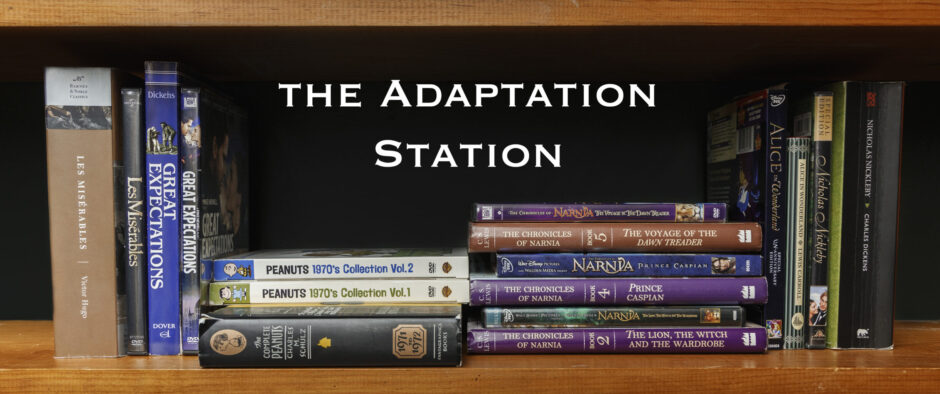David Copperfield, Charles Dickens’s beloved novel about friendship, marriage, parenthood and life in general, doesn’t necessarily lend itself that well to a movie. Not only is it long, like all of Dickens’s major novels, but it’s structured like an autobiography and rather than having one major problem to be solved, new problems keep popping up just as they do in real life.[1]Great Expectations and Bleak House also have first person narrators but they’re not structured like biographies. Its slow pacing, surprisingly complex characterizations and emphasis on the day-to-day realities of life make the book more suited for the miniseries format. But that hasn’t stopped filmmakers from trying to adapt it and I can’t blame them. Of all the films that have been made from David Copperfield, either for television or the big screen, I’m going to compare the 1935 movie, which was the first sound version, and the 2019 one, which is the most recent adaptation and also a sound version. (In case you don’t get my sense of humor, that last line was a joke.) Both have elements to make fans of the book stand up and cheer and elements to make them groan and sit down in disappointment.
David Copperfield (1935)

Clearly, director George Cukor (The Philadelphia Story, Gaslight) and screenwriters Howard Estabrook had a lot of love and respect for the original book. It’s a rare scene from this movie that isn’t brimming with fan pleasing little details, like the sheep that wander into church in an early scene. Young David’s harrowing trip from London to Canterbury on foot has seldom, if ever, been powerfully portrayed as it is here. Many of the novel’s larger than life characters feel as if they’d jumped off the page.


Of course, with only two hours and ten minutes to tell the story several memorable characters were also cut, including two of the most interesting, Mrs. Steerforth, mother of David’s false friend, James (Hugh Williams), and her companion, Rosa Dartle. A sad loss but probably better than including them without being able to do them justice. David’s stint as a student at Salem House is cut and he meets Steerforth at the academy of Dr. Strong, who is referred to but never seen.[2]In the book, Steerforth’s mother specifically sent him to a poor school so he would stand out, so this change costs a bit of development for the character. He never meets his good friend, Tommy Traddles, and his love interest, Sophy, at all. To be fair, while they’re very endearing in the book, I haven’t seen an adaptation that included them and made them really work, though I will say that one of the subplots makes less sense without Traddles. The movie completely reimagines how David meets his first wife, Dora Spenlow (Maureen O’ Sullivan), and portrays her as having been raised by her maiden aunts (Marion Ballou and Margaret Seddon), dropping the character of her father. While Mr. Spenlow in the book is a great character, I rather like this change since the aunts are fun characters who would normally be cut in shorter adaptations and even some longer ones and, again, the movie didn’t have time to do Dora’s father justice.

When the film was first released, Freddie Bartholomew’s performance as the young David was highly praised and Frank Lawton as the older version of the character was written off as bland by comparison. For me though, Bartholomew grows a little wearying, mainly because he sounds annoying when he, or rather his character, cries and he has to cry a lot. However, I wouldn’t say this makes his performance bad. After all, people do often sound annoying when they cry in real life. I enjoy watching Lawton more though.


Bartholomew isn’t the only one in the cast with whom I take issue. Young Fay Chaldecott is pretty terrible as Little Emily. Fortunately, she only has two scenes and hardly any dialogue. Florine McKinney is better as the older version of the character but not by as much as you’d hope. Maybe it’s just as well she has no dialogue at all.


Elizabeth Allan perfectly captures the personality of David’s immature mother, but with her constant posing, she feels laughably like a refugee from a silent movie. (If you’re familiar with Singin’ in the Rain, you know exactly what I mean.)

Fortunately, there are far more great performances in this star-studded movie than bad ones. As David’s ultimate love interest, Agnes Wickfield, Madge Evans feels like a holdover from the silent film era in the best sense with the way she conveys her entire character through her facial expressions. (Marilyn Knowlden plays her in the one scene of her as a child.)

Other standouts are Basil Rathbone as Edward Murstone, David’s abusive stepfather, Violet Kemble Cooper as said stepfather’s equally abusive sister, Jane, Jessie Ralph as David’s loving nurse, Clara Peggotty, Lionel Barrymore as her brother, Daniel, W. C. Fields as the lovable but perpetually in debt Wilkins Micawber, Edna Mae Oliver as David’s awesome battle axe of a great aunt, Betsey Trotwood and Roland Young as the slimy, scheming Uriah Heep. Many of them portray their characters more vividly than any other adaptation.



Well…sort of.
It’d be accurate to say that the movie captures the characters from the book at certain points better than any other adaptation, but it doesn’t really capture their character development or their hidden depths, which were a big part of David Copperfield‘s appeal. For example, Oliver is easily my favorite Betsey Trotwood when she’s in awesome battle axe mode. (The scene where she gives the Murdstones a dressing down is a highlight.)

But she doesn’t show the character growing more easygoing and tolerant as the story goes on. That might not be so much her fault as it is the fault of the script. For example, in the book, Betsey Trotwood starts out opposed to the whole idea of marriage, in part due to her own bad experience of it which this movie doesn’t even mention, but she eventually mellows out to point that she becomes downright fond of David’s aforementioned first wife, who is exactly the kind of ditz that would have driven her crazy at the beginning of the story. In this movie, she is at best tolerant of Dora but never loses her disapproving air. Still, she’s better served by this adaptation than her mentally disabled friend, Mr. Dick (Lennox Pawle), who, without the subplot of Dr. Strong and his wife, is reduced to an undeveloped comic figure. The same can be said of Mrs. Micawber (Jean Cadell), a surprisingly dramatic character in the book and one who comes across as strong and even heroic as often as she comes across as pathetic. Here she only has two scenes and is simply pathetic in both of them. The only characters who have anything like satisfying arcs are David himself, Micawber and arguably Dora.[3]The minor character of Mrs. Gummidge (Una O’ Connor) doesn’t so much undergo a character arc in the book or the movie as much as she changes her whole personality on a dime. For what … Continue reading


Still, if this David Copperfield feels more like a scrapbook of memorable moments from the book than a well-designed story in its own right with fully developed characters, it’s a pretty great scrapbook.[4]Much the same could be said of George Cukor’s Little Women and I’d say it’s less of a problem with this movie than that one, though that could be I’m just a more enthusiastic … Continue reading Even thus simplified, the characters are still hard to forget, and it would be wrong to say there’s no depth to them at all. Considering how rushed the character arcs that are included are, it’s impressive how well they work. The one scene where Steerforth shows guilt is great and I’m amazed by how much the film conveys in the short section of it that depicts David’s marriage to Dora. Not every fan of the book will completely love this adaptation but every one of them should seek it out.


The Personal History of David Copperfield (2019)
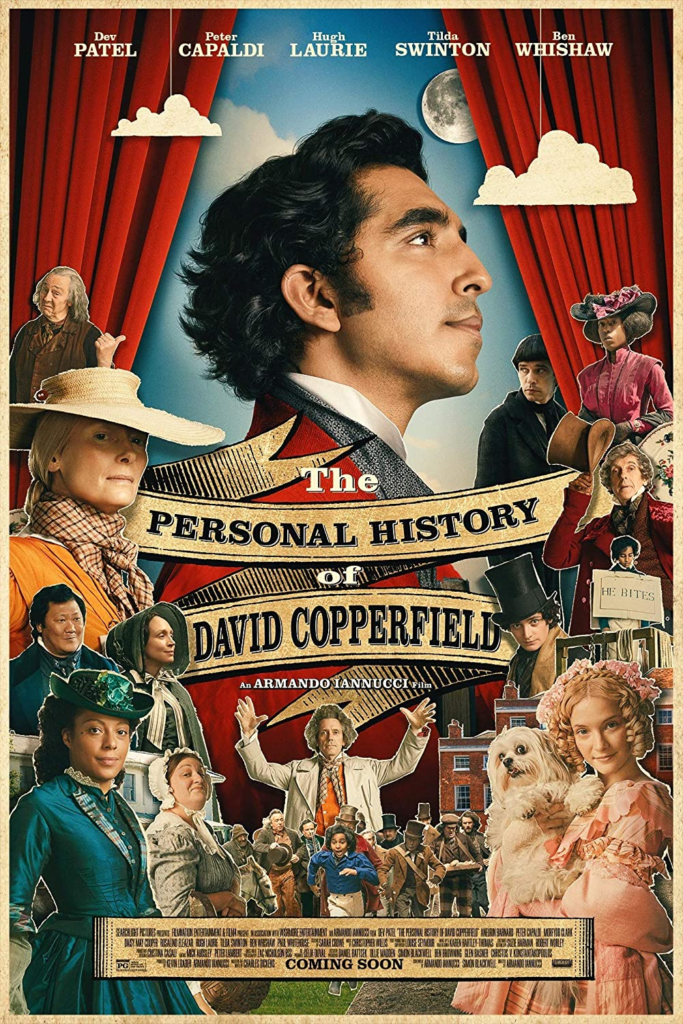
Director Armando Iannucci (The Death of Stalin) and his co-screenwriter Simon Blackwell also show a great deal of affection for the book, David Copperfield, in their adaptation, including little details such as young David (Jairah Vasani; Dev Patel plays the character as an adult) wondering if the world can really be round when he sees the flatness of the Yarmouth landscape. A number of similes and analogies from Dickens’s prose are actually worked into the dialogue[5]Actually, the characters tend to speak in similes even when they’re not using Dickens’s language. It’s that kind of movie., mainly David’s, foreshadowing his career as an author. (“You should write that down,” he’s told more than once.)[6]As I’ve written before, the version of the screenplay published online contained a number of allusions to Dickens books besides David Copperfield, most of which were ultimately cut. They … Continue reading But this movie doesn’t capture the overall feel of the book nearly as well as the 1935 movie or other adaptations have, and it isn’t even really trying to do so. In the words one insightful reviewer, this is more of a Dickensian Iannucci movie than an Iannuccian Dickens movie. Still, there are worse things than that.
The main way this movie departs from the book stylistically is by putting more of an emphasis on comedy. Even young David being caned by Mr. Murdstone (Darren Boyd) ends up being played for laughs. So is Mr. Wickfield (Benedict Wong)’s alcoholism, though it still retains its dramatic function. To the movie’s credit, those laughs are pretty big. The early scene of Wickfield repeatedly trying to steer the conversation toward drink and Betsey Trotwood (Tilda Swinton) firmly steering it away is hilarious. Still, would it have hurt the movie to have him undergo some character development instead of still being a pathetic clown at the end?
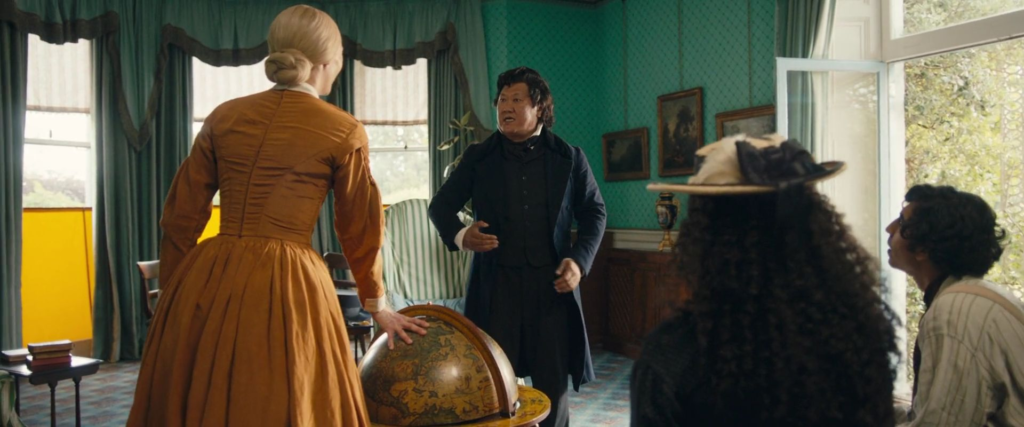
A benefit of the emphasis on comedy though is that scenes which might easily have been cut otherwise, such as David’s fight with a butcher’s boy (Aston McCauley) or his embarrassing night of drunkenness[7]That last scene is sped up like an old silent comedy, a stylistic flourish typical of this film’s whimsical sensibilities., are included.
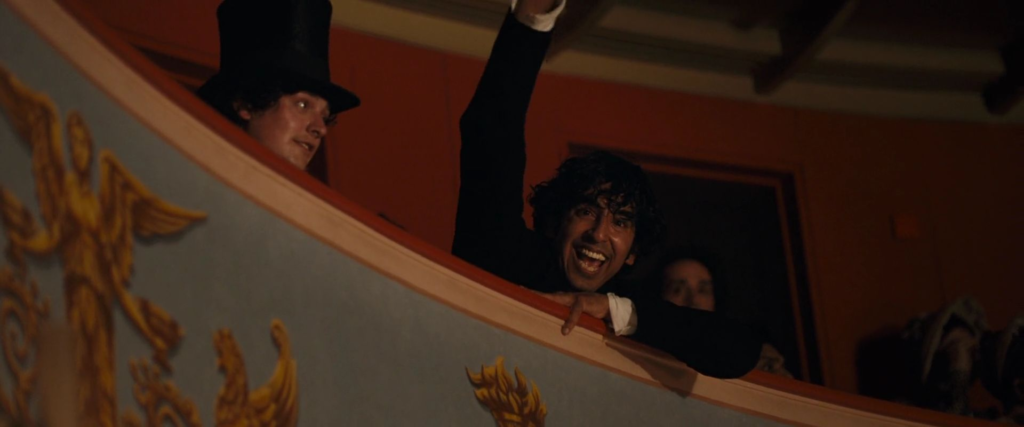
The humor doesn’t always feel like Dickens’s, being just a tad earthier and with more of an emphasis on self-consciously witty banter between the characters, but it’s often brilliant in its own way.
Still, this adaptation really doesn’t convey the book’s warmth. I know many readers feel that Dickens was too sentimental. I suppose with some of his books I can allow the validity of this criticism. But I defy anyone not to be moved by the relationship between David Copperfield and his old nurse, Peggotty (Daisy May Cooper in this version.) I defy anyone reading the book, that is. Their bond in this movie is…fine, but hardly as touching.
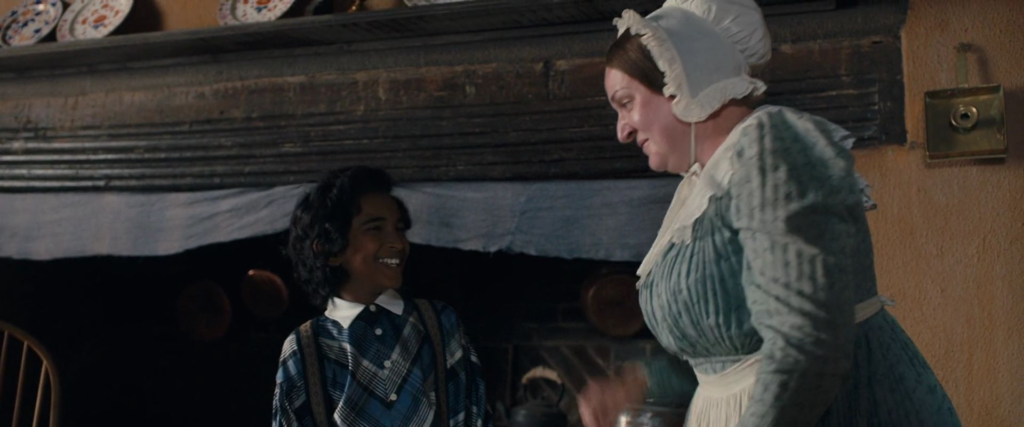
Compared to the 1935 adaptation, this one plays around with the book’s plot structure more, but it actually includes more characters, in part by combining them with each other. Thus Mr. Micawber (Peter Capaldi) is combined with Mr. Mell, one of David’s first teachers, and Peggotty’s brother, Daniel (Paul Whitehouse), is combined with her eventual husband, Barkis. (I mean, he takes on Barkis’s role of driving a horse and cart. Peggotty doesn’t commit incest in this version or anything.) More startingly, Steerforth’s prim mother (Nikki Amuka-Bird) and the fiery Rosa Dartle become one character, which I wouldn’t have thought would work but does.[8]Emily (Aimee Kelly) also gets one of Rosa’s lines (“When James was at his truest, he loved me”) which, again, I wouldn’t have expected to make sense but does.
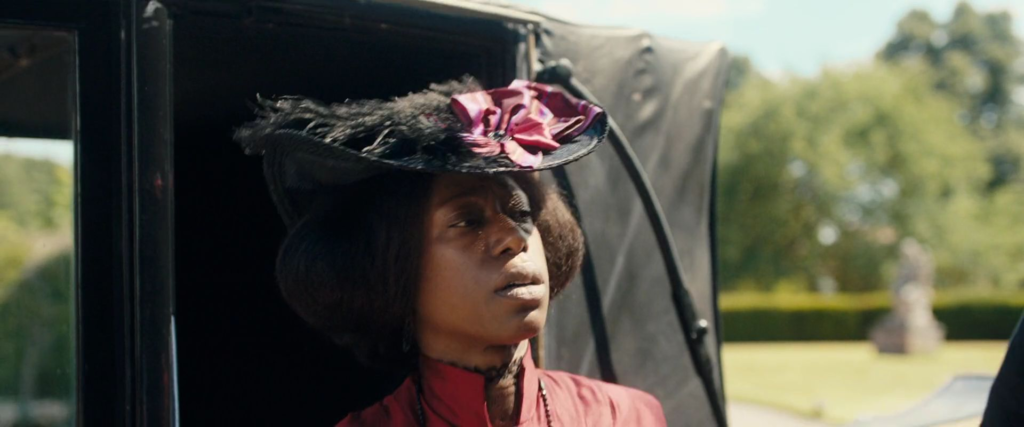
Like the 1935 movie, this one eliminates Salem House and has David meet Steerforth (Aneurin Barnard) at Dr. Strong’s. But rather than lose the soft-voiced, hard-hearted headmaster, Mr. Creakle (Victor McGuire), and his loud-voiced “translator,” Tungay (Peter Singh), it has them be young David’s supervisors at the blacking factory.
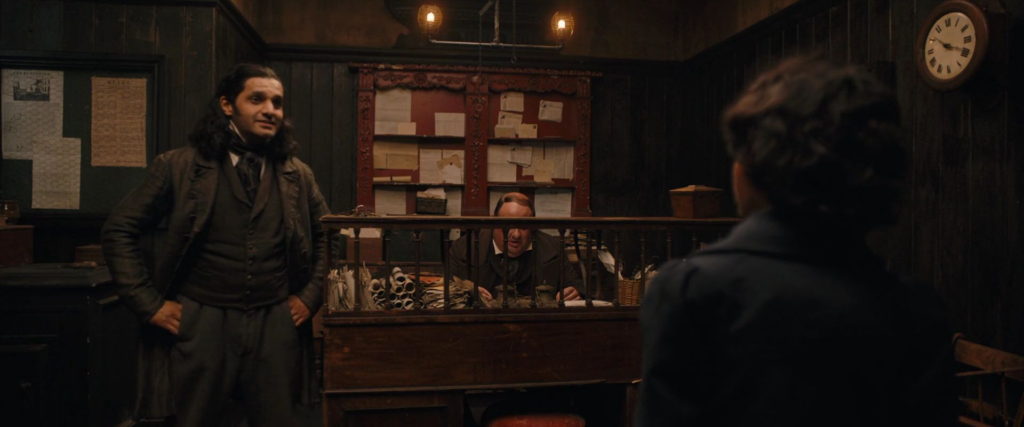
Unlike the 1935 movie, this one shows David’s time at Dr. Strong’s academy, but Dr. Strong’s is no longer run by Dr. Strong but by Mrs. Strong (Anna Maxwell Martin) who has nothing in common with either him or his wife from the book. This frustrates me since those characters are so seldom featured in even the longer adaptations, but this Mrs. Strong is a very fun character in her own right and feels fairly Dickensian in her comedy.
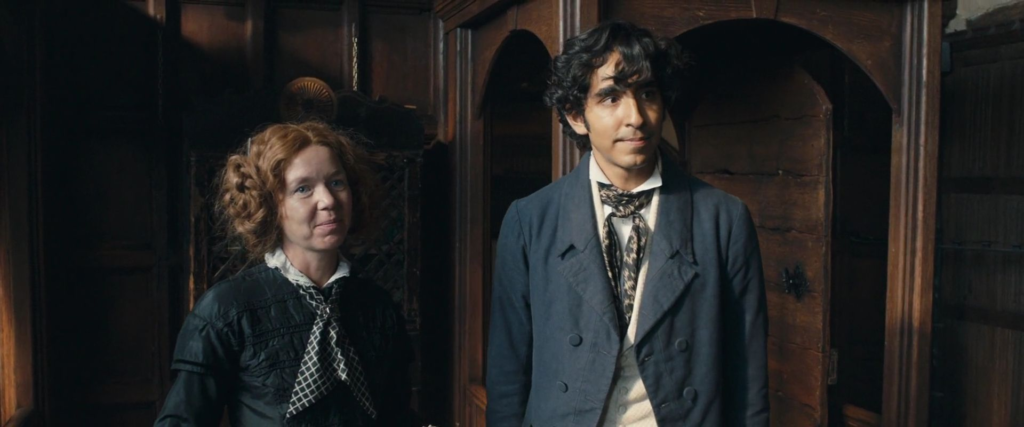
This adaptation has David run away from the blacking factory and seek out his great-aunt as an adult instead of a child. (Actually, I think he’s supposed to be a teenager at that point and only be an adult after his graduation, but it’s hard to tell, looking at his actor.) A side effect of this is that Betsey Trotwood loses the awesome dressing down she gives Murdstone and his sister (Gwendoline Christie.) A less eloquent one that David himself gives them, more or less, replaces it. As much as I hate this idea, having David and Agnes Wickfield (Rosalind Eleazer) be older when they meet allows the movie to develop their romance earlier. It pains me to admit it, but the emphasis on witty banter makes this Agnes a more fun character than her literary counterpart and the kindness she shows to Mr. Dick (Hugh Laurie) establishes her goodness more memorably than her introductory scenes in the book where we only see her being kind to David and her father.
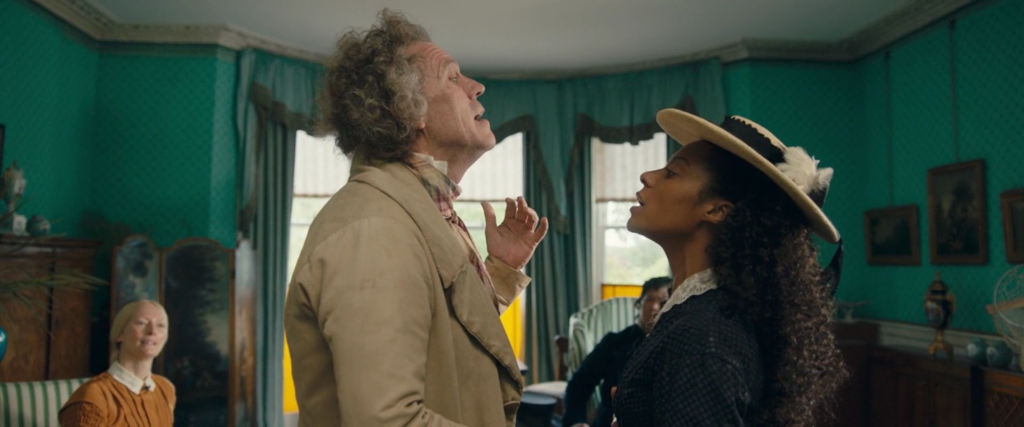
I do wish though that the movie had kept her kindness toward her romantic rival, Dora Spenlow (Morfydd Clark who doubles David’s mother.) Here all she has for her are a few brief snippy comments. I know Dickens’s leading ladies get criticized as sickeningly sweet, but if you ask me, Agnes not resenting-or trying not to resent-Dora her luck and even having compassion for her can be very compelling. The relationship between David and Dora is vastly simplified while still paying tribute to her character arc in the book. This saves the movie from biting off more than it can chew dramatically, but it also means losing one of the most unique and interesting depictions of a bad marriage in Dickens, one in which neither partner is “the bad guy.” That’s arguably pretty unique for storytelling in general.
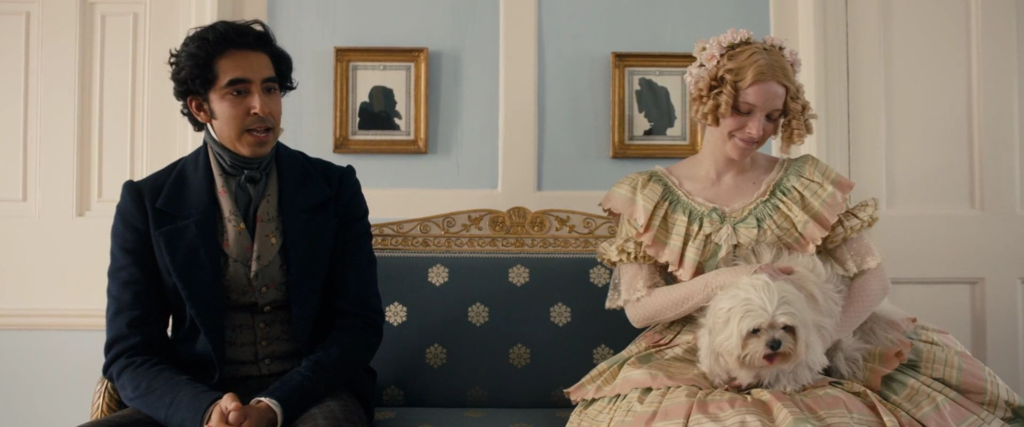
The book, David Copperfield, already had an unusually low body count for its author and this adaptation makes it even lower. In doing so, it makes an ending that already felt a bit too like wish fulfillment even more so. I have to say however that I prefer this lighthearted take on the source material to the gloomy 1969 made-for-TV movie, which focused entirely on David’s regrets over Dora and Steerforth.[9]It did adapt some of the book’s other famous subplots but in such a rushed and perfunctory way as to make them seem inexplicable.
The casting is fine. The best part of it is Dev Patel, who brings both an endearing earnestness and perfect comedic timing to the lovable dingbat of a lead. And when he’s called upon to imitate his costars, in his character’s capacity as a storyteller, he does so beautifully. Rosalind Eleazer and Morfydd Clark also shine, and Peter Capaldi and Hugh Laurie have some fun though I can’t help seeing them as too thin to be Micawber and Mr. Dick. But, in general, everyone is simply adequate in their roles without making much of an impression. As Uriah Heep, for example, Ben Whishaw is nowhere near the grotesque monster that Dickens described, though that could be because the movie reimagines his character so that we start out pitying him before seeing his true colors. (Not a bad idea if the character absolutely had to be reimagined.)
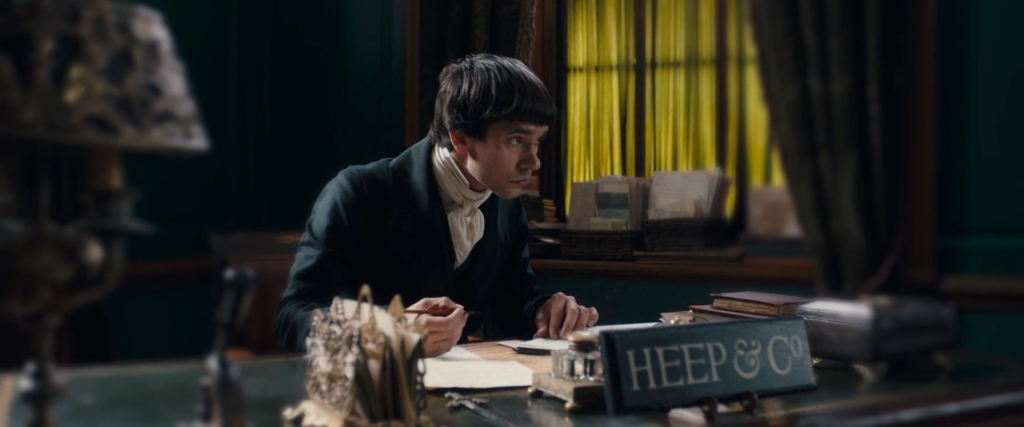
Still, if this David Copperfield doesn’t boast nearly as many great performances as the 1935 one, it doesn’t have as many bad ones either.[10]I seem to be beginning a lot of sentences in this post with “Still.” These are just those kinds of movies. If anyone is miscast, it’s Aneurin Barnard, who is a little too obviously evil as Steerforth.
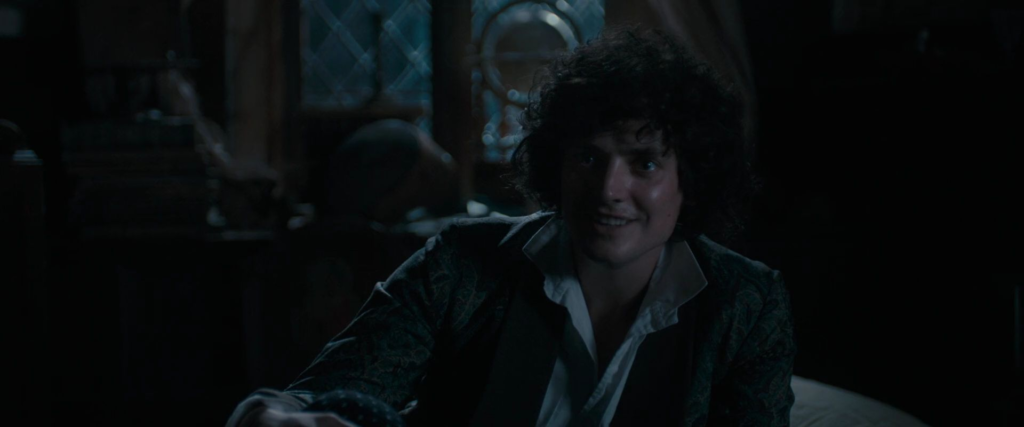
For all that this movie prioritizes comedy over sentiment, I’d be doing it a terrible injustice if I didn’t mention that it actually does a better job giving the characters arcs than the 1935 movie and even better than some of the longer miniseries. This isn’t true in every case. Micawber, one supporting character who did have something like a good arc in the 1935 movie, loses it here as other characters take on his role in Uriah Heep’s defeat. The movie still tries to give him serious scenes, but he always comes across as pathetic in them, never heroic. And Mrs. Micawber (Bronagh Gallagher who once played a version of Mrs. Nickleby) is again reduced to a simple comic figure.
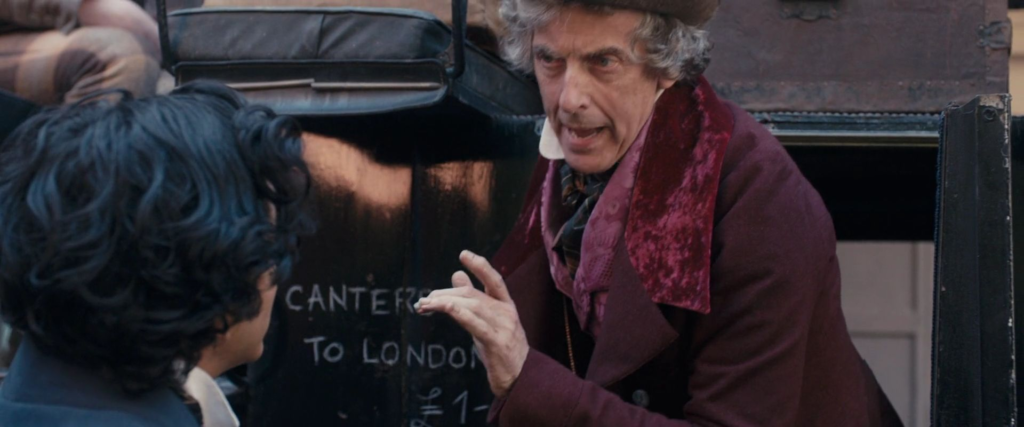
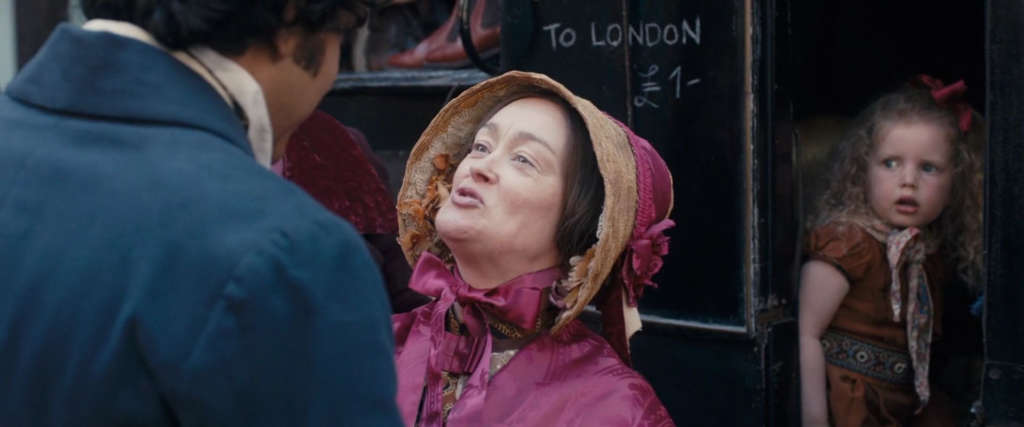
But Betsey Trotwood’s backstory, the payoff of which is often cut in adaptations, gets a new one here. And while Dr. Strong’s subplot is cut as usual, Mr. Dick is given another way to prove his intelligence and be a hero in this adaptation. Ironically, this movie does more justice to the tragic side of his character than any of the more dramatic adaptations I’ve seen. Maybe the idea behind this David Copperfield was to draw out the comedy of the characters usually seen as serious and the seriousness of those usually seen as comic. Probably not, at least with the second half, since it’s really only Mr. Dick of whom it’s true. Ah well. Mission accomplished anyway.
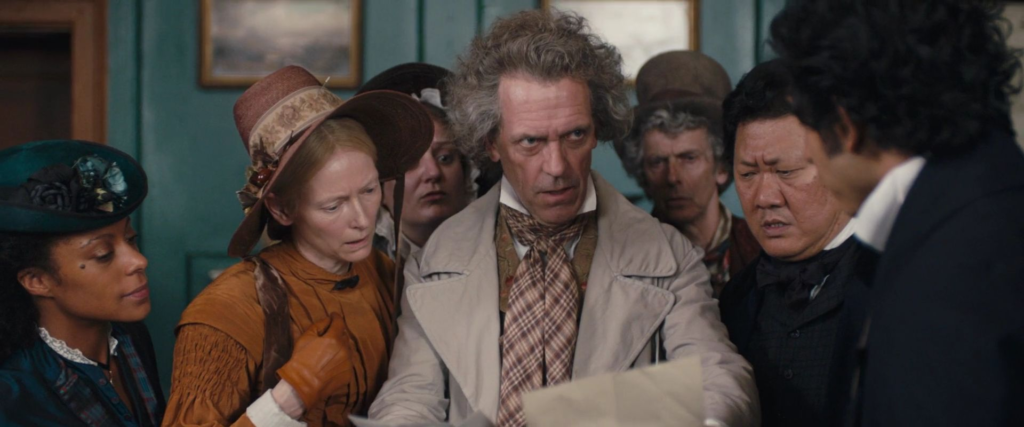
Concluding Thoughts
Which of these two movies do I think is the better? I really can’t say. The 2019 one has a much less lumpy, random structure. It feels less crammed with underdeveloped subplots and it’s the one which modern audiences are more likely to enjoy. But I can’t forget all the ways in which the 1935 movie strikes me as the more faithful adaptation. I know there are going to be people saying I should judge these movies on their own merits as movies. But I’m sorry, I can’t accept that. Things like Betsey Trotwood confronting the Murdstones and David’s first marriage, are objectively great.[11]I know, I know, all art is subjective. But come on! We’re talking about David Copperfield here. How can I say the 2019 movie is better than the 1935 one when it cuts them and the latter doesn’t?
My favorite adaptation, period, is the 1999 miniseries and I’m not just saying that because it’s longer than either of these movies. It’s only a two-part miniseries. There are ones far longer that I don’t enjoy as much. What makes it my favorite…actually, I think I’ll write about that in another post. But not before I bring back “The Animation Station” to commemorate the start of Summer with a post on the best cartoon series about Summer ever. (Actually, it might be the only cartoon series specifically about Summer.) My readers will just have to wait to read about my favorite David Copperfield adaptation. Hopefully, it’ll be worth it for them.

References
| ↑1 | Great Expectations and Bleak House also have first person narrators but they’re not structured like biographies. |
|---|---|
| ↑2 | In the book, Steerforth’s mother specifically sent him to a poor school so he would stand out, so this change costs a bit of development for the character. |
| ↑3 | The minor character of Mrs. Gummidge (Una O’ Connor) doesn’t so much undergo a character arc in the book or the movie as much as she changes her whole personality on a dime. For what it’s worth though, the moment in which she changes is a heartwarming one in both. |
| ↑4 | Much the same could be said of George Cukor’s Little Women and I’d say it’s less of a problem with this movie than that one, though that could be I’m just a more enthusiastic fan of this material. |
| ↑5 | Actually, the characters tend to speak in similes even when they’re not using Dickens’s language. It’s that kind of movie. |
| ↑6 | As I’ve written before, the version of the screenplay published online contained a number of allusions to Dickens books besides David Copperfield, most of which were ultimately cut. They probably would have been too confusing for casual viewers, but I appreciate the idea. |
| ↑7 | That last scene is sped up like an old silent comedy, a stylistic flourish typical of this film’s whimsical sensibilities. |
| ↑8 | Emily (Aimee Kelly) also gets one of Rosa’s lines (“When James was at his truest, he loved me”) which, again, I wouldn’t have expected to make sense but does. |
| ↑9 | It did adapt some of the book’s other famous subplots but in such a rushed and perfunctory way as to make them seem inexplicable. |
| ↑10 | I seem to be beginning a lot of sentences in this post with “Still.” These are just those kinds of movies. |
| ↑11 | I know, I know, all art is subjective. But come on! We’re talking about David Copperfield here. |
